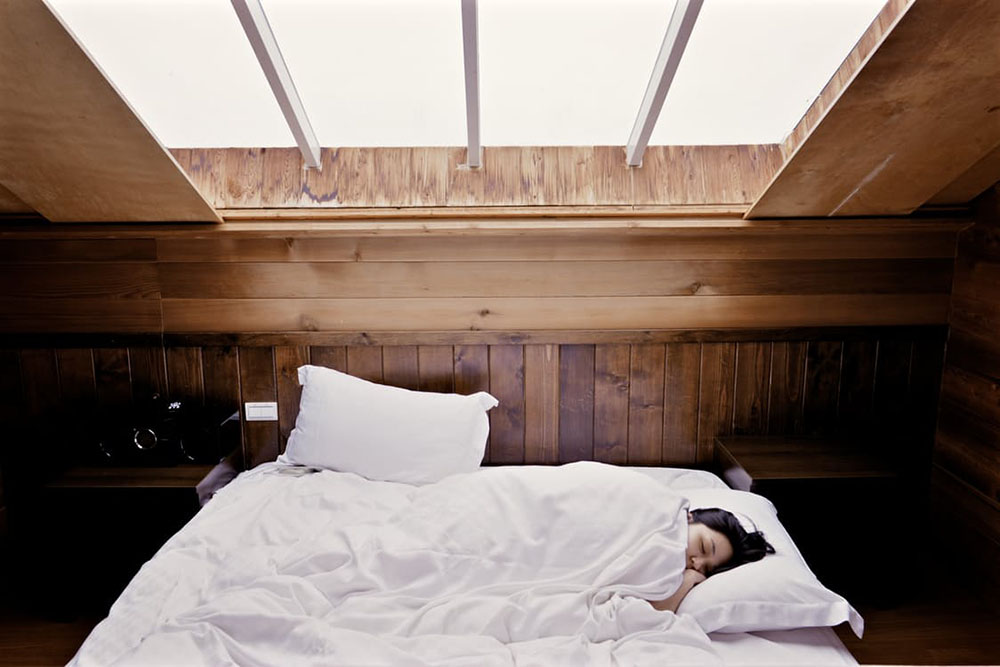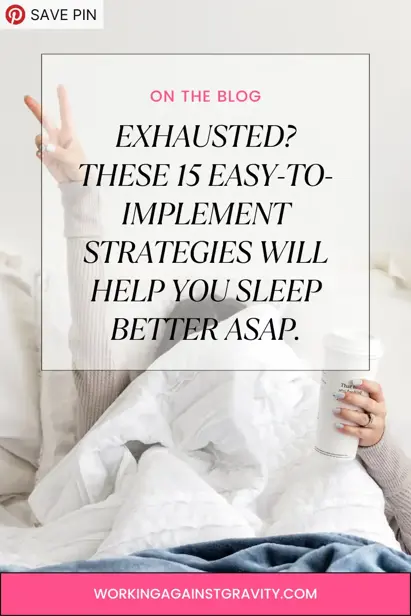
Dialing in your sleep is a major proponent for healthy weight loss, busting through weight loss plateaus, mood and energy regulation, and so much more.
Your goals don’t have to be body composition or athletic-based to see the direct correlation between sleep and performance. Want a job promotion? Need to work on your relationship? Find yourself feeling “down” or lacking motivation? Sleep improves your attention to detail, quality of work, mood, patience, and outlook on, well, everything.

15 Tips for Better Sleep
1. Banish Blue Light
TV, computer, and phone screens emit a blue light, which directly inhibits melatonin production—this makes it tough for your body to know when it is time to sleep. Turn off devices at least 30 minutes before bedtime.
2. Update Your Mattress
Are you still sleeping on your old college mattress? It may be time for an upgrade. The Better Sleep Council recommends updating your mattress every seven years—although this can differ based on mattress quality, use, and materials.
Advertisement
3. Eat Complex Carbs at Night
Eating complex carbohydrates before bed can increase hormones that help with satiation and relaxation. Complex carbohydrates are slower digesting than their simple counterparts which encourages satiation and blood sugar stabilization.
4. Skip the Alcohol
Caffeine, alcohol, and sugar do the opposite of helping you wind down for a solid night’s sleep. Have your last cup of coffee as far away from bedtime as possible, and limit alcohol before bed so you can successfully get into deep sleep cycles.
5. Create a Bedtime Routine
A before-bed routine works wonders and cues your body to wind down for sleep. This could include taking a warm bath or shower, reading a book, drinking tea, listening to soothing music. or dimming the lights to start signaling that it’s bedtime. Read more on creating a bedtime routine in this article.
6. Stretch and Roll
Aches, pains, and stiffness can make sleep uncomfortable and cause unnecessary wake-ups. Stretch and roll your muscles to help reduce these aches and pains and improve your athletic and sleep performance.
7. Keep Your Bedroom Cool
Your core temperature drops while you sleep, and you'll sleep more soundly in a cool room. Use a fan or air conditioner to give your body some help and ensure your room doesn't get too hot. The Sleep Foundation puts the best sleeping temperature between 60-68°F.
Advertisement
8. Take Note
If you struggle to fall asleep because you’re already thinking about tomorrow's stressors or to-do list, keep a notepad handy. Jot down a quick note to ensure you remember the most important things, and then get back to bed. Do your best to keep lights low (or better yet, off!) if you try this out!
9. Exercise Regularly
Exercise releases endorphins and other hormones that help you relax and tire you out—what’s not to love? Just going for a walk can improve your likeliness of falling asleep quickly.
10. Utilize White Noise
A Hatch machine isn't just for little ones! White noise can help drown out unwanted peripheral noises that would otherwise wake you up. This is especially helpful if you live next to a busy road or sleep in the same room as a partner, roommate, or pets.
11. Mimic the Sunrise
If you don't have the ability to wake up with the sun, a Sunrise Alarm Clock is a great way to mimic natural wake-up with soft sounds and natural light. It’s a fantastic way to start the day while allowing you to keep your phone outside of your bedroom (see #13). Bonus? The Hatch machine linked above doubles as a white noise machine and a sunrise alarm clock!
12. Keep Your Room Dark
Cover the windows to ensure changes in light won't wake you up. This is especially important if you are a shift worker and need to sleep during the day.
Advertisement
13. Keep Your Phone Outside of the Bedroom
We already mentioned the negative impacts of blue light, but the mental distraction of having your phone next to you all night (yep, even if it is on silent!) makes it harder to fully relax. Keeping your phone outside of your bedroom also encourages a more positive wake-up experience—you won't start your day on social media or be inundated with negative news.
14. Get Comfortable
It seems obvious, but it goes without saying that comfy pajamas, a soft comforter, a pillow, and a mattress will help you sleep well. Avoid sleeping in clothes you'd work in so your mind keeps "training" and "sleeping" separate.
15. Balance Your Hydration
Too much or too little water and food before bed can disrupt your sleep. You’ll either need to get up to use the bathroom or wake up thirsty or hungry. Work to get the balance just right based on your body and bedtime. A good starting place is to aim to have your last meal and drink at least an hour before bed.
Get a 1-on-1 Coach for Better Sleep
Dialing in overall health goes beyond the foods you eat, which is why a 1-on-1 nutrition coach will help you improve all the factors that impact your goals—like sleep!
They'll help you determine what is already working in your routine and where to start focusing your energy to get the most bang for your sleep buck. Our coaches get to know you, your goals, your schedule, and your body to personalize, monitor, and adjust a program that actually works because it is custom to you.
Advertisement
Schedule a Free Intro Call
Working Against Gravity has led the macro tracking and health space for over a decade. Our team doesn’t just understand the science of nutrition—we’ve spent years mastering the art of tailoring it to fit your life. That means no cookie-cutter plans, just real strategies that have worked for over 30,000 people.
Schedule a free call with our team to learn how working with a 1-on-1 WAG coach will help you reach your goals.



